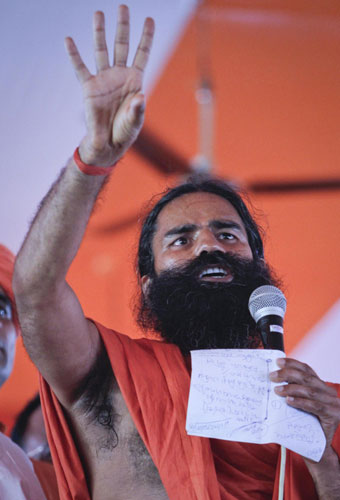Photos
Indian anti-graft yoga guru begins fast to death
Updated: 2011-06-04 16:42
(Agencies)
 |
|
India's yoga guru Swami Ramdev addresses his supporters at the Ramlila grounds where he was scheduled to start his fast in New Delhi, June 3, 2011. [Photo/Agencies] |
NEW DELHI - India's most famous yoga guru began a mass fast to the death on Saturday to demand reforms including the death penalty for corrupt officials in an anti-graft campaign that has undermined an embattled and scandal-tainted Prime Minister Manmohan Singh.
The saffron-robed and bearded Swami Ramdev, who rose from an illiterate family to host a television show with 30 million viewers and owns a "peace" island in Scotland, sat with thousands of followers in a tent the size of four football pitches in Delhi.
|
||||
One newspaper called it "Yogitation".
"We are not deviating ... Our issues are black money, corruption," Ramdev told a thunderous crowd as he started his hunger strike in a tent where hundreds of ceiling fans whirred in the summer heat. "And we have to stay firm."
"Nothing is impossible, everything is possible and we are not going to be defeated."
His campaign is the latest embarrassment for a Congress party-led coalition hit by graft scandals including allegations of kickbacks at the Commonwealth Games and a telecoms scam that may have cost the government up to $39 billion.
Graft has long been a part of daily life from getting an electricity connection to signing business deals, but the latest scandals - that have seen a minister jailed and business billionaires questioned - are unprecedented.
Such is Ramdev's popularity in the electorally important states of north India that four government ministers, including Finance Minister Pranab Mukherjee, met him in Delhi after he descended from his private plane to persuade him to stop. Negotiations have so far been fruitless.
Investors worry the latest troubles will again force the government to pay less attention to reform bills, such as making it easier for industry to acquire land, postponed due to opposition protests over graft causing parliamentary deadlock.
Thousands of Indians also fasted in the tent while the guru's followers as far away as the state of Orissa and the city of Mumbai also began hunger strikes.
While many followers are poor, others in the tent were well dressed professionals, mingling with foreign tourists and villagers who had travelled hundreds of miles to see him.
"India is in crisis, crime is up, corruption is up," said police constable Jaivir Gurjar, 46. "The economy is growing but the poor remain poor. Congress party has been in government for most of independent India and look where we are."
Ramdev's fast comes after a similar one by social activist Anna Hazare, whose April campaign rang a chord with millions of Indians and forced the government to make legislative concessions on an anti-corruption bill that effectively gives India an independent ombudsman to battle graft.
Both campaigns have underscored how India's traditional national parties are struggling to deal with the growing anger at middle class Indians increasingly fed up with graft, leaving a political vacuum that figures like Ramdev can fill.
Political ambitions?
Ramdev's yoga demonstrations, filled with crowd-pleasing stunts such as headstands or making his belly dance inside his ribcage, are often punctuated by rambling lectures on corruption, black money or the government's failure to tackle rebels.
But few expect Ramdev will die for his cause. Like Hazare, most commentators expect some deal will be forged that will give the yoga guru enough for him to claim moral victory and possibly help the launch of his political party for 2014 elections.
Critics say he is also linked to a radical Hindu nationalist group.
His outspoken positions on homosexuality, which he says is a curable mental illness, and sex education to prevent HIV and AIDS, which he says should be withdrawn from schools and replaced by yoga, have also been criticised.
The Hindu newspaper reported his fast had been planned for months and the organisation of his campaign was impressive.
Giant television screens broadcast Ramdev's meditation sessions and speech. There were abundant water supplies laid on in the harsh summer heat.
Paying for it is no problem. His global business has a turnover of $40 million a year.
Politicians fear that outrage over corruption scandals, made all the harder to stomach by rising food and fuel prices, may turn into a national popular movement against the establishment.
Specials

Birthday a new 'starting point'
China's national English language newspaper aims for a top-notch international all-media group.

Room at the inn
The Chinese hotel industry experiences a building boom, prompting fears of oversupply.

Pearls of wisdom
Chinese pearl farmers dominate the world market but now want to work smarter, not harder
